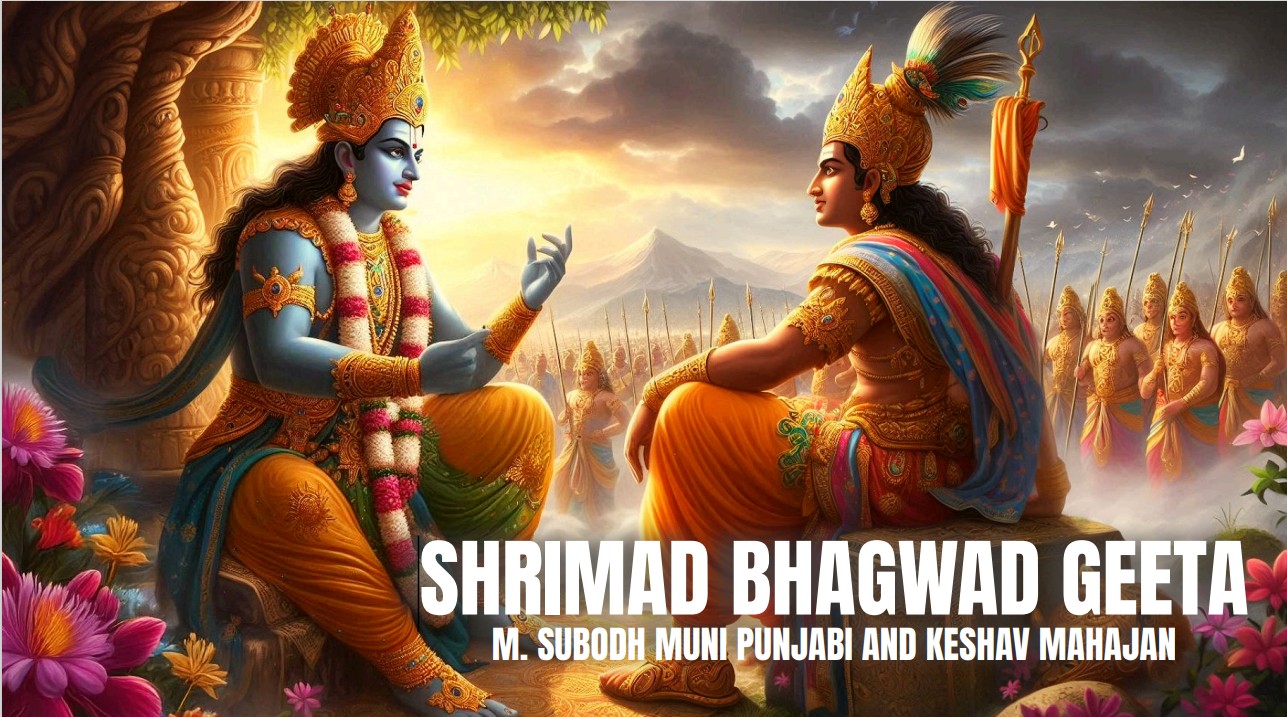THE THIRD CHAPTER

Arjuna said: “O Janardana, if you consider knowledge superior to action, why do you engage me in this dreadful warfare? You seem to confuse my understanding with contradictory advice. Please tell me decisively which one is better.”
The Lord replied: "O sinless Arjuna, at the dawn of creation, I prescribed the path of knowledge for those inclined towards contemplation and the path of selfless action for those engaged in service. Both paths lead to ultimate good. Without action, one cannot attain knowledge, and without knowledge, liberation is unattainable.
One cannot abstain from action even for a moment; all beings are compelled to act by nature. Those who outwardly restrain their senses but inwardly dwell on pleasures are hypocrites. But those who control their senses through the mind and engage in action without attachment are truly noble.
O Arjuna, perform your duty without attachment, for action is superior to inaction. Even the maintenance of your body would be impossible without action.
When God created beings with His Maya, He also ordained selfless action and declared that by following this dharma, beings would prosper. This dharma would fulfill desires and please divine incarnations through sacrifice. In turn, these deities would grant desired enjoyments.
However, those who indulge in these gifts without gratitude towards God or generosity towards sages incur severe punishment in the afterlife. Actions such as eating are inherently sinful because they cause harm to other beings. Therefore, one should offer food to God and share it with saints to absolve these sins.
Beings arise from food; food comes from rain; rain is born from sacrifice; sacrifice stems from duty; duty arises from the Vedas; the Vedas come from the eternal Brahma. Thus, the all-pervading God is present even in sacrifices.
Those who do not follow this cycle of sacrifice and indulge solely in sensual pleasures live in vain."
The wise who are devoted to God need not perform actions influenced by the three qualities of nature (Trigunas). They incur no sin by abstaining from such actions and seek no refuge but God. Arjuna, relinquish ego and attachment to outcomes, and act with knowledge. Like the wise King Janaka, you too can achieve liberation through righteous action.
Great people set an example for others; I, Krishna, have no need for action, yet I engage in it for the welfare of the world. If I were not to act, it would lead to chaos and societal collapse.
Just as the ignorant act for personal gain, the wise should act selflessly for the world’s benefit. They should not disturb the ignorant but guide them towards right action.
All actions are influenced by nature’s qualities; the wise understand this and remain unattached. Dedicate all your actions to me, Krishna, free from desire and anxiety. Those who follow this path of knowledge are liberated from karma.
Even if one’s own dharma is imperfect and fraught with difficulties, it is better to follow it than another’s dharma, which may seem perfect but leads to misery.
Arjuna asked, “O beacon of the Yadava clan! O Lord! Why does a person fear sin yet still commits it? What compels them to sin despite their reluctance?”
Lord Krishna replied, "Arjuna, these sinful actions and anger stem from Rajoguna. They are insatiable gluttons, always hungry and filled with hope day and night. They are significant sins, like robbers blocking the path to salvation, the great enemies of my devotees, compelling beings to sin. Such actions bring disgrace in this world and suffering in the afterlife, leading souls to Yamaraj’s abode where they endure immense pain without any savior.
Those who are estranged from me and lack devotion suffer endlessly, both in this world and the next. They are like those who cannot discern between milk and buttermilk, swans and herons, brass and gold, diamonds and glass. They foolishly equate the incarnations of deities with the Supreme Light due to their ignorance of Brahmvidya.
My true devotees, who understand Brahmvidya, worship me as Brahma, Vishnu, or Shankara’s father. They are like jewelers who distinguish between diamonds and glass, discarding the worthless and treasuring the valuable. Similarly, those who recognize my Nirguna Brahmvidya forsake lesser devotions and worship me—the source of bliss, Mukunda, supreme joy, lord of Maya, and the all-knowing inner self—residing in the hearts of my beloved devotees.
Just as a mirror becomes obscured by grime or a fetus is enveloped by membranes, so too are beings consumed by sinful desire and anger, rendering them powerless. Anger is the enemy of knowledge; it veils wisdom and leads to ignorance. These desires are never satisfied.
Now heed the abodes of this anger: the senses, mind, and intellect. To defeat this foe that destroys knowledge, one must first conquer its dwelling places. Subdue your senses—the primary residence of sinful desire and anger—and you will vanquish them with ease.
Remember, Arjuna: The senses are mightier than the body; the mind surpasses the senses; intellect exceeds the mind; but anger is mightier than intellect. By mastering your senses and mind, you can destroy these enemies embodied as lust and anger."
ITI SHRIMADBHAGWADGEETASUPANISHATSHU BRAHMAVIDYAYAM YOGSHASTRE SHRIKRISHNAARJUN SAMVADE KARMAYOGONAM TRITIYOADHYAYAH ॥3॥
|| SHRIKRISHAN ARPAN MASTU ||
